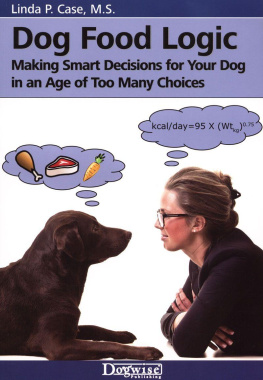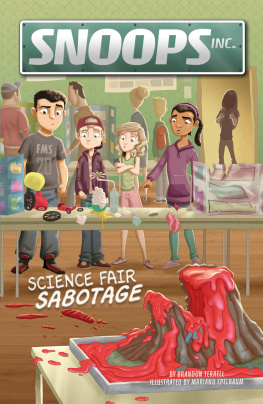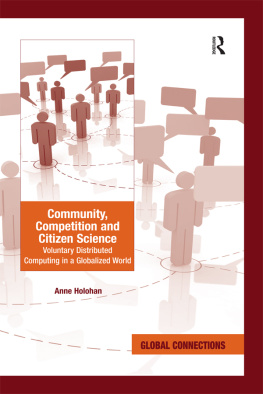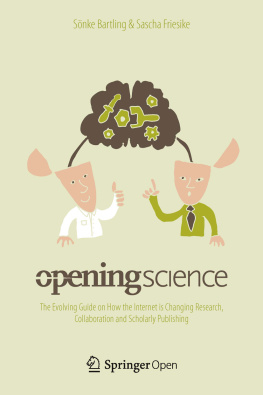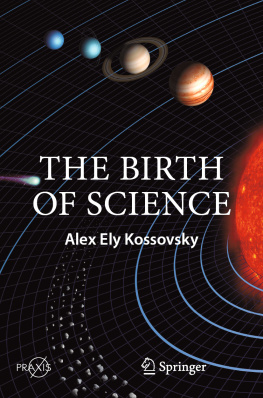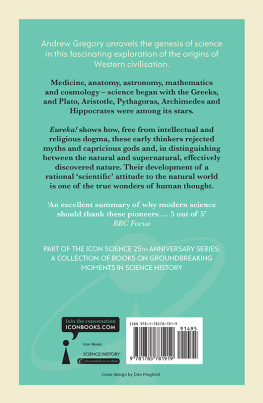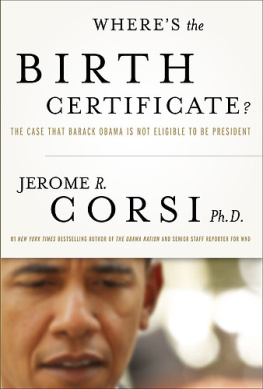Competition is a surprisingly difficult concept even to define. Modern lexicographers have failed repeatedly to improve on the definition given by Samuel Johnson in his 1755 work Dictionary of the English Language . In it he declares competition to be a noun meaning the act of endeavoring to gain what another endeavors to gain at the same time; rivalry; contest. Yet even this definition is unacceptably narrow, since it limits to two the number of admissible competitors. Auctions, spelling bees, primary elections, horse races, and track and field events, as well as golf, tennis, and bowling tournaments, typically allow large numbers of hopefuls to compete. At the very least, Dr. Johnsons definition should be amended to read what others endeavor to gain.
Like solitaire, crosswords, picture-, and other sorts of puzzles may be viewed as single-player games. All such games can, in principle, be solved mathematically. Although it might take the fastest conceivable computer millions of years to crack a particularly difficult puzzle, it is at least possible to define what is meant by a solution, and to specify the steps a computer would have to perform in order to find one. The same cannot be said of contests open to three or more competitors, since there is no universally accepted definition of a solution. As a result, leading authorities can disagree as to which, if any, of several proposed solutions for a particular many-player game is valid.
Two-player games can go either way. Those of the zero-sum variety, in which the winner wins only what the loser loses, are almost as solvable as puzzles and solitaire. Those that are not zero-sum are nearly as insoluble as many-player games. It is indeed unfortunate that the forms of competition that most directly affect human welfaresuch as wars and commercial competitionare rarely zero-sum, and typically involve more than two competing factions. It is worth noting that, whenever many-player games such as Scrabble and Monopoly are contested at the tournament level, the rules are altered to transform them into two-player zero-sum games. Many-player and non-zero-sum games are simply too confusing for tournament play. With three or more players, there would be no end of complaints from alleged victims of collusion.
It was not until 1944 that John von Neumann and Oskar Morgenstern developed a truly workable definition of competition. It took them an entire chapter of their ground-breaking Theory of Games and Economic Behavior to explain what they had done. From the realization that a game is for analytical purposesnothing more than a book of rules, they distilled a concise (if forbiddingly technical) definition of a game. Only gradually did it become clear that all forms of competition can be made, with but little modification, to fit their definition. Indeed, more than sixty years after they wrote, no one has identified a form of competition that seems incompatible with the von NeumannMorgenstern definition of a game. In 1950, Harold Kuhn developed the simpler and more graphic, yet logically equivalent, form of that definition to be found in Chapter 3. Though dictionaries may never include the entry compe

tition (k

mp

t

sh

n), n. See GAME, the emerging science of competition has yet to discover anything suggesting that such an entry would be misleading.
You wont find many departments of competition science listed alongside those of physics, chemistry, and food science in the catalogs of leading colleges and universities. There is as yet no Journal of Competition Science , nor any Society of Competition Scientists. Perhaps there never will be. Leaders in the field seem content to regard themselves as biologists, psychologists, computer scientists, statisticians, economists, mathematicians, and highway engineers. Yet all are keenly aware of the similarity between the mental gymnastics required of chess players, political consultants, military strategists, corporate planners, and others who compete for a living. Perhaps this book will alert them to the fact that the makings of a genuine and very practical science lie scattered throughout the literature of the decision sciences.
By far the most spectacular achievement of the new science has been the defeat of world chess champion Garry Kasparov by the IBM computer Deep Blue. There have, however, been plenty of other stirring victories. Computers now dominate the strongest human players of many familiar board games, as well as games encountered in the military, in commerce, and in government.
Thats the good news. The bad news is that competition science is inescapably mathematicalall but impossible to explain in wholly non-mathematical terms. Though every effort has been made to minimize the number of pages infected with mathematical symbolism, I know not how to eliminate them all. What math remains is presented mainly in graphical form, since many readers find pictures less daunting than equations.
The most notable conquests of man by machine have made less use of mathematical game theory than of systematic experiment. Every computer chess, checkers, or backgammon tournament ever played, as well as every game of any kind between man and machine, has constituted a potentially telling experiment. It is impossible to count the number of such experiments conducted since the dawn of the computer age, or the number of once-plausible hypotheses rejected in the process.
Einstein once expressed the opinion that the Development of Western Science is based on two great achievements: the invention of the formal logical system (in Euclidean geometry) by the Greek philosophers, and the discovery of the possibility to find out causal relationships by systematic experiment (Renaissance). Only after combining the two did Western Science initiate the four centuries of ever-accelerating material progress that history now records. And only after experimental methods began to complement a priori mathematical reasoning was significant progress made against the more challenging board games, like chess and checkers.
The first part of the book explains the nature and sources of mans existing knowledge of competition, while the secondlengthier and more controversialexplores economic competition. The latter, it will be argued, bears little resemblance to the carefully choreographed minuet described in books on the subject and too often relied upon to assert the will of the consumer. Indeed consumer sovereignty is but one of several colossal fictions enshrined in mainstream economic theory. The central thesis of that vast oversimplification holds that something called perfect competition compels free markets to allocate scarce resources in a manner so efficient that all of mankinds conflicting wants and needs are resolved in the most satisfactory manner possible. On paper, all free markets work in more or less the same way.
In practice, most appear to work very differently, both from one another and from the way they are all said to work. Perhaps thats why so much jawboning is required to convince the public that things are not as they seem, but as free market logic commands them to be. Does it seem unwise to eliminate the inheritance tax on the superrich? Free market principles uphold the wisdom of such reform. Does it seem heartless to depress the minimum wage? Free market evangelists portray it as an act of compassion. Does it seem counterproductive to out-source American manufacturing jobs? Free market ideologues depict outsourcing as a subsidy to the lower middle class. And so on. It will be argued presently that the more preposterous claims of orthodox economic theory are direct consequences of expert willingness to conflate actual with perfect competition.


 tition (k
tition (k  mp
mp  t
t  sh
sh  n), n. See GAME, the emerging science of competition has yet to discover anything suggesting that such an entry would be misleading.
n), n. See GAME, the emerging science of competition has yet to discover anything suggesting that such an entry would be misleading.


